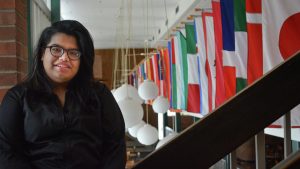
BEMIDJI — The Christmas holiday is no “Silent Night” for 16-year-old BSU student Lissel Flores of Honduras.
Instead, it’s filled with up-beat music, eating and socializing long into the night. Thirty or 40 family members and friends may come over to the house and bet money to see who can stay up the latest. The Merengue music is turned on, and everybody grabs a dance partner.
Flores planned to return to Honduras to spend Christmas at home. Although it’s not necessarily the reason she returned home for break, American Christmas, she said, can become a little dry for someone accustomed to Latin festivities.
“The music is really slow. It gives me depression,” Flores, a freshman studying cellular and molecular biology, said about American Christmas music. “In Honduras, there’s music — like you can dance. The environment is just like, in a few words, it’s more on.”
Christmas means different things for BSU’s international students, who number approximately 110 and hail from more than 30 countries.
According to BSU International Program Center Director Cherish Hagen-Swanson, the most represented countries include China, Canada and Nepal, with more than 50 students coming from those three nations. The rest of the international student body is made up of one or two students from any given country.
And as the semester break creeped closer, international students had a slew of different plans for how they were going to celebrate one of the biggest holidays on the calendar.
Similar but different
Some of the U.S. holiday traditions seem very familiar for the foreign students. Some of their home traditions have a little twist, making them appear familiar but still slightly different from those in the U.S. Others still may be seemingly unrecognizable.
In Mumbai, India, for example, they don’t have what Americans would recognize as “Christmas trees.” Instead, they have smaller, tropical versions. 19-year-old sophomore Sarvika Shetty said that’s at least partially because the apartments many people in the city live in are too small to handle anything bigger.
“In Mumbai, the houses are really small, so it’s a problem getting big trees,” Shetty said.
At least a handful of the international students grew up with some Christmas traditions similar to those they’ve seen in America. Both Priscilla Amissah of Ghana and Shetty grew up watching “Home Alone.” Amissah, in fact, said her family would watch it nearly every year.
Shetty will spend the holiday with some local friends in the Bemidji area, experiencing a white Christmas. She spent Christmas last year in Bemidji, as well, which allowed her to find a tree that was a little bigger than those she remembers from back home.
“That was the first time I ever decorated my own tree,” Shetty said. “That was exciting.”
Amissah also is experiencing a much colder Christmas than those she grew up with. Back home in Africa, she normally would have gone to the beach at some point during the holiday.
Coming from tropical Honduras, Flores said she was rather surprised at how much Americans — or at least Minnesotans — associate Christmas with exclusively cold weather.
“One of the different things is how people expect the snow,” Flores said. “The people that surround me, at least the people I have known, they don’t feel like it’s Christmas season if there’s no snow.”
While some American traditions have parallels for the international students, others are simply unrelatable. In the days leading up to Christmas, Indian children use old newspaper, an old shirt, and a mask to create a man that would then be burned shortly thereafter during the New Year celebrations.
And then, for some international students, Christmas isn’t necessarily a familiar celebration at all. Unlike Flores who plans to head home, or Shetty who’s staying with friends in Bemidji, 21-year-old exhibit design major Yuwen Ju from China will spend her Christmas in Miami with a friend.
Although she’s experienced some aspects of Christmas, such as when she got a picture with Santa last year in Chicago, or watched Western movies growing up, the holiday isn’t something in which she invests a lot of energy. The big holiday back home, she said, is the Spring Festival, which celebrates the beginning of the Chinese New Year.
“Christmas, you know, is a Western festival. It’s becoming more and more popular now (in China),” Ju said. “In my mind, I just feel like Christmas to you — to Americans — feels like the Spring Festival to us.”
